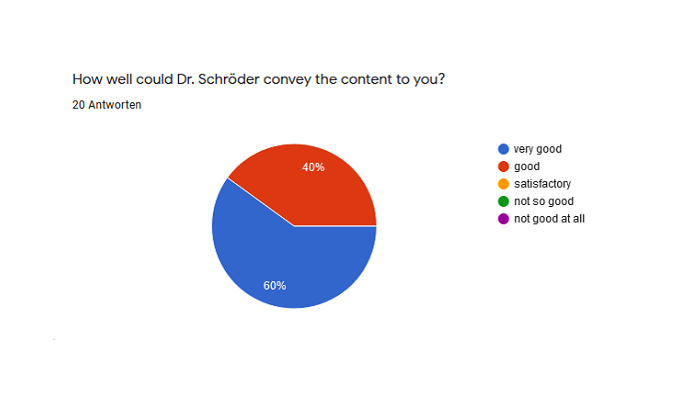Dry content brought to life
In order to prepare our students optimally for the next stage of their careers, teaching good scientific practice is essential. Offering a course on Good Scientific Practice was very well received by our students, which made it possible to run two courses with 15 participants each in September 2020.
Although the course could only take place online, the participants appreciated how the experienced lecturer Dr. Peter Schröder from Mainz, who had completely adapted the course to the department, the career level and the demands of the students, ran the course. Important topics such as the documentation of data, guidelines and ethics for animal experimental work, correct behaviour on the subject of scientific misconduct and conflict management and the associated function of an ombudsperson were lively discussed, along with other important points.
The relaxed and very accommodating manner of the speaker encouraged even rather reserved participants to ask questions and join in the discussion. During the breaks and at the end, Dr. Schröder invited the students to have individual discussions. In this way, a course that the students of the Elite Graduate Program "Integrated Immunology" had previously considered rather dry turned into a very lively course with many case studies to be discussed, which in turn could be used to derive abstract facts and guidelines at a later stage.
From course to application
Many of the students were already able to apply some of the topics intensively discussed in the course when writing their Master's thesis. The preparation of experiments, especially in the context of sensibly justified animal experiments and an exact documentation of all experiments with a final correct evaluation have top priority. Further applications of these important guidelines now await the first graduates of the course in the context of their doctoral thesis.
In an evaluation of the course, all participants would recommend the course to others and many would like to see an equally interactive advanced course on the subject and rate the subject as extremely important for their next career stage. For the organisation of key competences, it remains to be said that it is important to convey the subject matter in a lively and application-oriented manner.
Text: Rudolfo Karl, Anja Glanz, Elite Graduate Program "Integrated Immunology"



